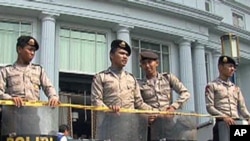Indonesian authorities are learning a great deal about a new militant coalition calling itself al-Qaida Indonesia in Aceh. Since February security forces discovered a militant training camp in Aceh, and have killed eight suspects and arrested 48 others. But security analysts say more action is needed to monitor suspects and prevent extremists from spreading their violent message.
Security analyst Ken Conboy says before two Jakarta hotels were bombed last July, there was a long period of relative calm in Indonesia that allowed terrorist groups to reorganize. "For four years nothing had happened and I think there was quite a bit of complacency among some of the security forces," he said. "The common wisdom was that the most dangerous extremists had more or less gone into retirement. They were not doing anything. And then all of a sudden there was a huge wake up call in July of 2009, last year, when they realized that not only were they still around and active, but they had pieced together a relatively sophisticated operation under the noses of everybody in the city."
Indonesian security forces pursued the perpetrators of the hotel bombings, including mastermind Noordin Top, who was killed in a police raid in September.
As part of their efforts to disrupt new attacks, in February police discovered a new terrorist coalition operating a training camp in Aceh. In the crackdown that followed, 48 suspects were arrested and eight killed. Among the dead was Dulmatin, one of Indonesia's most wanted terrorist suspects for his role in the 2002 Bali bombings that killed 202 people.
Terrorism expert Sidney Jones is with the International Crisis Group. Her new report details a great deal of intelligence about the new terrorist organization, which calls itself al-Qaida Indonesia in Aceh. "This group in some ways was less radical than Noordin Top's in that it believed that the goal should be to establish Islamic law, not just to blow things up. But that in the course of establishing Islamic law, it was permissible to make attacks on anyone who stood in the way," she explained.
She says the group advocates the assassination of elected Indonesian leaders opposed to imposing Islamic, or Sharia, law. Members also favored operating from the base they set up in Aceh in part because the semi-autonomous region of Indonesia has implemented Sharia.
Jones says Aceh residents, who in 2005 ended a 30-year separatist insurgency, reported the camp to authorities. "It was a huge miscalculation. Why they thought they would get support in a place like Aceh that is just recovering from violence, I have no idea, except that there were two people with long experience in Aceh who were part of this coalition," she said.
The crackdown that followed, she says, effectively dismantled the operation for now.
Her report details a number of recommendations to prevent the growth of new militant movements. Chief among them is increased surveillance of prisoners and ex-prisoners who have been involved in terrorist planning and recruitment.
Conboy says to do so effectively police will need additional resources and training. "There have been literally hundreds of extremists that have been detained over the years and to monitor all of them would be rather difficult," he said. "So I guess they have to do some profiling and figure out which ones are going to be the most likely repeat offenders, or the ones who were definitely not repentant when they were in detention and monitor them."
Jones also says Indonesian authorities should go after the growing number of organizations that spread extremist messages. She says, however, the government should censor them, but should monitor them, making sure they register with authorities and pay taxes.
"In a country that has just recovered from an authoritarian past and is doing extremely well in establishing democratic institutions, the last thing you want to do is start re-imposing censorship or restrictions on freedom of expression. So the dilemma is what can you do about these extremist media businesses? And one answer is look very carefully at existing regulations that have to do with publishing houses, and see whether each of these houses is obeying the law to the letter, and if not, they should be punished or they should be held in violation of those laws," she said.
Jones says Indonesia has had great success in using police enforcement to suppress terrorism but that more can be done in an open democratic society to prevent acts of violence.
Security Analysts say al-Qaida Indonesia in Aceh Temporarily Crippled









